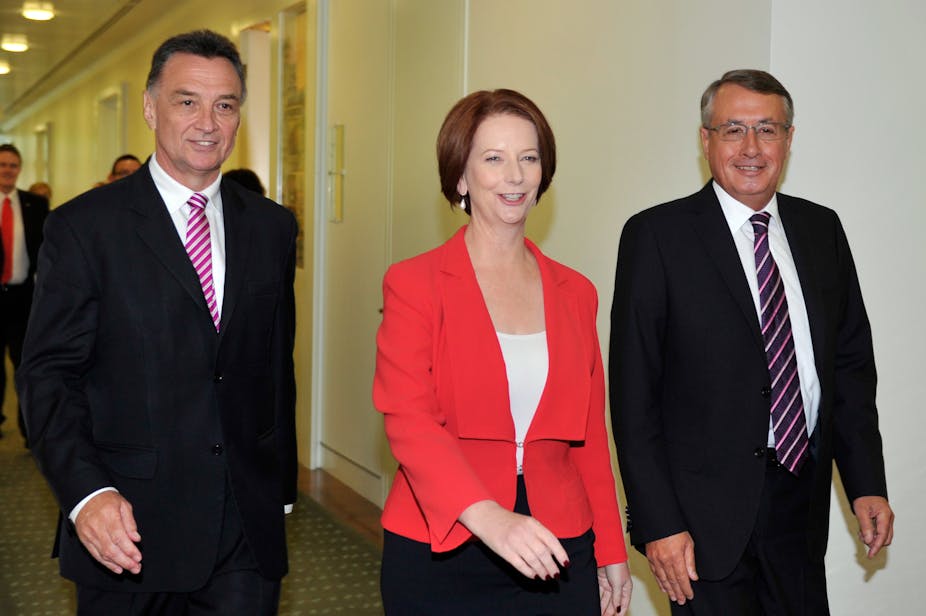Julia Gillard lives to fight another day, having being reelected unopposed at this afternoon’s caucus meeting.
While Rudd declared he would not nominate for the leadership this time, the destablisation by his supporters has undoubtedly damaged both Gillard and the perception of the party as a whole.
So where now for Labor? And what does this continual jockeying over the leadership - which is not restricted to the ALP or federal politics - say about the wider Australian political landscape?
There is a scene in Monty Python’s Life of Brian, when Brian has been crucified and is sitting on the cross. Through the Roman lines breaks the “Suicide Squad of Judea” and for a moment, everyone thinks they are saved. The Squad proudly proclaim their mission as “suicide”, and even though they have a chance to continue their run at the Romans, they lift their breastplates and stab themselves in the heart.
Watching that again recently, it is surprising how much this scene reminds me of the Federal Labor Party.
As our federal government descended into farce in order to decide our national leader once again, it’s worth asking whether our elected representatives are more concerned with coming together to govern the country, or splitting apart to save their skins at the next election.
Since Julia Gillard called a ballot to depose Kevin Rudd way back in 2010, the former Prime Minister has been a thorny issue for the government, highlighted by the leadership ballot last year. The issue of leadership has clearly distracted the government from actually running the country, and today’s tumultuous events showcase to the public just how much the Labor party is riven by internal factions.
This is the third leadership ballot in under three years, and it underscores Australian politics increased descent into internal popularity contests conducted without the input of the voters.
The biggest example of Australia’s rapid descent into quick fire leadership challenges can be seen in the NSW Labor Party. After the stable decade long leadership of Bob Carr, the state saw three premiers in five years, with one, Nathan Rees, memorably declaring his removal to be the work of “faceless men” operating out of public view.
The predilection for changing leaders has now been given the moniker “NSW Disease”, a pejorative term indicating a party riven with internal factions, headed by a puppet installed at the whim of the ascendant faceless men.
Yet this disease is not just contained to NSW, or even Labor, spreading as it has to other states and political parties. Earlier this month the Premier of Victoria Ted Baillieu resigned in the face of an internal revolt, another first term casualty.
And a week later Terry Mills was unceremoniously sacked while on official business in Japan, only six months after leading the Country Liberal Party out of opposition. One must wonder if Campbell Newman is somewhat nervous in Queensland.
And as many are noting: maybe Malcolm Turnbull is planning his run only after Tony Abbott may be elected.

The trend is clear. Australian political leaders now run a huge risk of being deposed by their party. Whether this means they have to spend more time placating backbenchers and ministers, as opposed to making decisions in the best interests of their state, or country, is up for debate. But it would be naïve to think leadership rumblings don’t distract our key parliamentarians from their core duties, especially when the press is fed daily leaks detailing inner bickerings and disputes.
The danger of constantly agitating for a new leader is clear. In the absence of a direct vote for the state or national leader, the public is locked out of these discussions. Our election campaigns may be growing more presidential, focussing as they do on the leader to the exclusion of ministers and policies, yet we still only elect our parliamentarians, who decide who to elect as their leaders in turn. The public outcry when Kevin Rudd was replaced by Julia Gillard in 2010 is instructive.
Kevin Rudd was impossible to work with, the ALP ministers protested, yet he was clearly a very popular figure in the community. The public confusion after his axing highlighted the problem with our political system as it currently stands. By running such a presidential style campaign, many people simply voted for Kevin Rudd over John Howard, not Labor over the Coalition.
Perhaps it is time to break a sacred Australian political taboo and suggest the time has come to directly elect our leaders. The current sagas engulfing both our state and federal governments are clearly a huge distraction, taking precious time away from affairs of state and directing them towards internal politics.
Is it really that hard to stick with a leader for a full term? And if they’re that bad, why shouldn’t they go to the ballot box to face the wrath of the public, instead of simply putting a new face forward? Most people might consider this a crafty trick, and in the wake of today’s events it would be hard to disagree with them.
We need leaders that will break though the many complex and wicked problems confronting our society: entrenched cross-generational poverty, climate change, the changing security environment are just three.
Instead we get a version of a Monty Python scene – one that captures the absurdity of opening up your breastplate and doing the Opposition’s dirty work for them.

